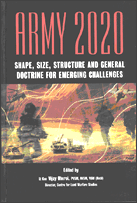 By Lt Gen Vijay Oberoi By Lt Gen Vijay Oberoi
Price Rs.620 | US$.18
The Indian Army has an unenviable reputation for professionalism, discipline and dedication to duty. It has excelled in the most trying operational conditions in many wars and conflicts. Today, it is a highly respected army, which has built an exclusive niche for itself amongst the major armies in the world.
The 21st century has ushered in major changes in the security environment, which are modifying the nature of war. Conscious of this change, which is attributed to the revolution in military affairs (RMA), currently underway, as well as other factors, the Indian Army also wants to remain current in the coming decades, so that its structures and doctrine are in tune with the operational realities.
The nuclearisation of the region has also impacted in a major way on the regional and global security environment. Thus, there is a need for the fourth largest army of the world to take a hard and deep look at its doctrine, concepts, structures, organisations and roles.
This book examines the scenarios in which the Indian Army of 2020 will be required to operate and suggests measures for its smooth transformation in to a force of the future.
Published by : KW Publishers Pvt Ltd, New Delhi
About the author:
Lieutenant General Vijay Oberoi, was commissioned in the Maratha Light Infantry Regiment in 1961. He has held many prestigious command and staff appointments during his long career spanning over four decades. A war veteran, General Oberoi soldiered on in his regiment despite losing his leg in the Indo-Pak Conflict of 1965. The General has commanded two armies: the Army Training Command and the Western Command. He has also been Director General of Military Operations and retired as Vice Chief of the Army Staff.
General Oberoi was an International Fellow at the US Army War College for one year, in 1988-89. He has also served with distinction as the Military, Naval and Air Advisor in the High Commission of India at Kuala Lumpur, Malaysia.
During his service, General Oberoi has earned the reputation as a ‘thinking’ person, with a flair for new ideas, innovative stances and hard training.
After retirement, he has devoted himself to studies and writing on defence and security issues. He is the Founding Director of The Centre for Land Warfare Studies (CLAWS). He is also the President of the War Wounded Foundation, which works for the long-term rehabilitation of the war disabled personnel of the three services. |
 By Lt Gen Vijay Oberoi
By Lt Gen Vijay Oberoi


